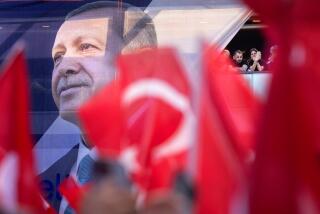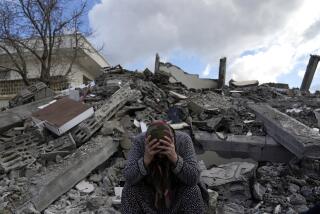Dispute Over Pipeline Puts U.S., Turkey on Collision Course for Confrontation : Diplomacy: Ankara wants the oil languishing in conduit from Iraq. Washington says U.N. sanctions forbid it.
- Share via
WASHINGTON — The United States and Turkey are heading toward a major confrontation over U.N.-imposed economic sanctions against Iraq, specifically the ban on Turkey’s use of an oil pipeline between Iraq and the Mediterranean.
The dispute potentially threatens the cohesion of the U.S.-led coalition trying to squeeze Iraqi President Saddam Hussein from power, according to U.S. and Turkish analysts. “Keeping the coalition in line is getting increasingly difficult,” a leading U.S. analyst said. “There are real stresses and strains.”
Moreover, the dispute could strain relations between the United States and a strategic North Atlantic Treaty Organization ally. It could even jeopardize the future of the embattled Kurdish minority in Iraq.
The confrontation centers on a deal that Turkey quietly worked out with Iraq this spring to reopen the pipeline after flushing out 12 million barrels of oil that have been sitting in it since Iraq’s 1990 invasion of Kuwait. Turkey, in a serious recession, badly needs the revenue from the oil. In exchange for access to the oil, Turkey would send Iraq food, medicine and other humanitarian goods.
The Clinton Administration moved quickly to block the deal on the grounds that it violated U.N. sanctions. U.N. Ambassador Madeleine Albright and U.S. Ambassador to Turkey Richard Barkley formally protested to ranking Turkish officials, Turkish and U.S. officials said.
Turkey pleaded its case on the basis of Article 50 of the U.N. Charter, which allows a third party adversely affected by sanctions to appeal for relief.
Turkey claims that sanctions have cost it $20 billion in lost business with Iraq since 1990, a figure deemed high by U.S. officials. The pipeline alone has cost more than $500,000 in annual losses for Turkey, according to Phebe Marr, a senior fellow at the National Defense University here. In the late 1980s, before sanctions, Iraq was the second largest customer for Turkish exports.
In addition, the government of Turkish Prime Minister Tansu Ciller argued that the pipeline would corrode unless it was flushed.
The Clinton Administration countered with a compromise allowing the initial flushing plus one or two others for pipeline repairs and economic relief.
But at the United Nations, Britain, France and Russia demanded that the compromise include payment from the pipeline’s revenues to the U.N. Compensation Commission that was set up after the 1991 Persian Gulf War to oversee Iraqi reparations for war damage, according to Turkish sources.
The sanctions allow Iraq to sell its oil to buy humanitarian goods. But 30% of its profits must first go to the U.N. commission, and as much as 10% more can be taken by the United Nations to cover its operating expenses in Iraq. Of the 12 million barrels in the pipeline, 8.2 million barrels belong to Iraq and 3.8 million barrels belong to Turkey.
Unless a compromise is worked out, Ciller’s government has threatened implicitly to block renewal of Operation Provide Comfort when it comes up for review in Parliament at the end of this month. Operation Provide Comfort, which has been increasingly controversial in Turkey, where it is based, provides humanitarian aid and air protection for Kurds living in northern Iraq.
The end of Operation Provide Comfort probably would enable Hussein to reabsorb Kurdistan, which rose up against his regime after the Persian Gulf War. A subsequent crackdown led nearly 2 million Kurds to flee to the borders of Iran and Turkey in 1991--and to the coalition’s intervention with Provide Comfort.
“Solidarity is not a one-way street,” Ozdem Sanberk, Turkish undersecretary for foreign affairs, told The Times. “We stood up with the coalition and assumed a huge responsibility, which we still have. We now have a problem as a result of the embargo that needs to be addressed by our partners.”
Turkey’s economic problems have begun to take a major toll. On May Day this year, tens of thousands of workers protested the impact of the government’s austerity program and their country’s 100% annual inflation.
“At the moment, there is an uneasiness in our Parliament and a perception that there is not sufficient care by our partners,” said Sanberk, who was in Washington last week and at U.N. headquarters in New York on Monday to try to work out a compromise. “The government needs to be able to show public opinion that the problems are being addressed.”
U.S. officials are playing down the immediate dangers of a rift.
“Once the government looks at the strategic trade-offs, the prime minister will see Provide Comfort as the most important thing we’re doing together in the post-Cold War world,” a senior official said.
The Clinton Administration also thinks that a further short-term accommodation can be reached by the coalition allies. But a compromise with Turkey is unlikely to end the saga.
First, Iraq still has leverage. Turkey will have to go back there to get approval of any new formula. And in the past, Hussein’s regime has refused to sell its oil to pay for humanitarian goods rather than pay a percentage to the United Nations.
“The Iraqis are in the driver’s seat as far as the Turks are concerned,” a U.S. official said. “They can say: ‘This is the way we want to do it, or we won’t let it happen at all.’ Then the Turks have to make a tough choice.”
Iraq sees the Turkish deal as a means of undermining the sanctions regime and potentially breaking up the coalition, U.S. officials say. Opening up the Turkish front would be the beginning of the end of sanctions.
But U.S. aid, which is shrinking, is not an alternative to end Turkey’s economic woes. Since the Cold War’s end, aid to Turkey has been cut back from about $900 million six years ago to less than $300 million for fiscal 1995.
Second, resolution of the immediate dispute will not solve either the broader problems that led Ciller to try to revive the pipeline or Turkey’s fundamental new differences with the allies.
Turkey has concluded that Hussein will survive sanctions, diplomatic isolation and other efforts to end his 15-year rule. Its domestic and regional policies are now based on those tenets, U.S. officials said.
In contrast, U.S. policy is to continue the sanctions and politically squeeze Iraq until Hussein is ousted. If the U.N. sanctions are lifted, Washington is expected to continue a unilateral economic embargo.
Turkey’s new assessment already has led the coalition to suspect that the pipeline deal would not be a onetime arrangement. Ciller has said publicly that she intends to continue to sell oil through the pipeline.
“She’s not being very cool about the way she goes about asking for favors,” a U.S. official said.
Because oil experts differ on whether the pipeline has been damaged by prolonged inactivity, U.S. analysts also suggest that Turkey’s argument may be a pretext to set a precedent.
In addition, pipelines cannot be left empty without the risk of damage. So after the flushings, it would have to be immediately filled again--thus creating the same situation as today, Turkish analysts say.
More to Read
Sign up for Essential California
The most important California stories and recommendations in your inbox every morning.
You may occasionally receive promotional content from the Los Angeles Times.













